沪教版六年级英语上册Unit 8-11复习资料
沪教版六年级英语(上册)_(全套)复习全全资料全
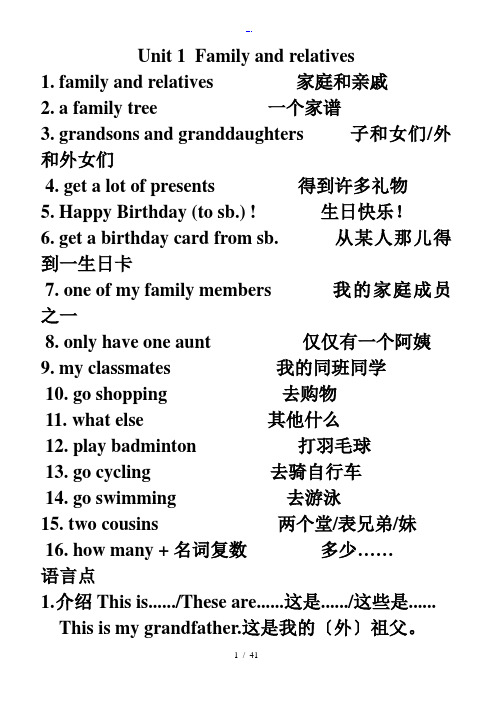
Unit 1 Family and relatives1. family and relatives 家庭和亲戚2. a family tree 一个家谱3. grandsons and granddaughters 子和女们/外和外女们4. get a lot of presents 得到许多礼物5. Happy Birthday (to sb.) ! 生日快乐!6. get a birthday card from sb. 从某人那儿得到一生日卡7. one of my family members 我的家庭成员之一8. only have one aunt 仅仅有一个阿姨9. my classmates 我的同班同学10. go shopping 去购物11. what else 其他什么12. play badminton 打羽毛球13. go cycling 去骑自行车14. go swimming 去游泳15. two cousins 两个堂/表兄弟/妹16. how many + 名词复数多少……语言点1.介绍 This is....../These are......这是....../这些是...... This is my grandfather.这是我的〔外〕祖父。
These are my family and relatives.这些是我的家人和亲戚。
注意句中各成分保持单复数同形。
2. I‟m their son.. 我是他们的儿子。
We‟re their sons.我们是他们的儿子。
3. 询问信息Who is this?/Who are these?这是谁?/这些是谁?How old is......? ......几岁?A:How many......have you got?你有多少......? B:I have got ...... / I have only got one......我有....../我只有一个......A:What do you usually do with your......?你通常和你的......做......?B:I always/usually/sometimes/never do sth. with my......我总是/通常/有时候/从不和我的...做...How many uncles do you have?你有多少个叔叔? How many后面接可数名词的复数形式。
沪教版六年级英语(上册)_(全套)复习资料全
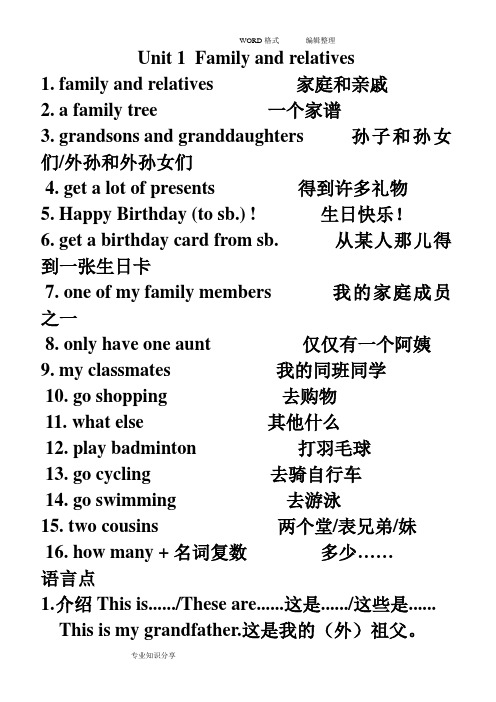
Unit 1 Family and relatives1. family and relatives 家庭和亲戚2. a family tree 一个家谱3. grandsons and granddaughters 孙子和孙女们/外孙和外孙女们4. get a lot of presents 得到许多礼物5. Happy Birthday (to sb.) ! 生日快乐!6. get a birthday card from sb. 从某人那儿得到一张生日卡7. one of my family members 我的家庭成员之一8. only have one aunt 仅仅有一个阿姨9. my classmates 我的同班同学10. go shopping 去购物11. what else 其他什么12. play badminton 打羽毛球13. go cycling 去骑自行车14. go swimming 去游泳15. two cousins 两个堂/表兄弟/妹16. how many + 名词复数多少……语言点1.介绍 This is....../These are......这是....../这些是...... This is my grandfather.这是我的(外)祖父。
These are my family and relatives.这些是我的家人和亲戚。
注意句中各成分保持单复数同形。
2. I‟m their son.. 我是他们的儿子。
We‟re their sons.我们是他们的儿子。
3. 询问信息Who is this?/Who are these?这是谁?/这些是谁?How old is......? ......几岁?A:How many......have you got?你有多少......? B:I have got ...... / I have only got one......我有....../我只有一个......A:What do you usually do with your......?你通常和你的......做......?B:I always/usually/sometimes/never do sth. with my......我总是/通常/有时候/从不和我的...做...How many uncles do you have?你有多少个叔叔? How many后面接可数名词的复数形式。
(最新)沪教版六年级英语(上册)-(全套)复习资料全

Unit 1 Family and relatives1. family and relatives 家庭和亲戚2. a family tree 一个家谱3. grandsons and granddaughters 孙子和孙女们/外孙和外孙女们4. get a lot of presents 得到许多礼物5. Happy Birthday (to sb.) ! 生日快乐!6. get a birthday card from sb. 从某人那儿得到一张生日卡7. one of my family members 我的家庭成员之一8. only have one aunt 仅仅有一个阿姨9. my classmates 我的同班同学10. go shopping 去购物11. what else 其他什么12. play badminton 打羽毛球13. go cycling 去骑自行车14. go swimming 去游泳15. two cousins 两个堂/表兄弟/妹16. how many + 名词复数多少……语言点1.介绍 This is....../These are......这是....../这些是...... This is my grandfather.这是我的(外)祖父。
These are my family and relatives.这些是我的家人和亲戚。
注意句中各成分保持单复数同形。
2. I‟m their son.. 我是他们的儿子。
We‟re their sons.我们是他们的儿子。
3. 询问信息Who is this?/Who are these?这是谁?/这些是谁?How old is......? ......几岁?A:How many......have you got?你有多少......? B:I have got ...... / I have only got one......我有....../我只有一个......A:What do you usually do with your......?你通常和你的......做......?B:I always/usually/sometimes/never do sth. with my......我总是/通常/有时候/从不和我的...做...How many uncles do you have?你有多少个叔叔? How many后面接可数名词的复数形式。
沪教版六年级英语上册全套复习资料.doc
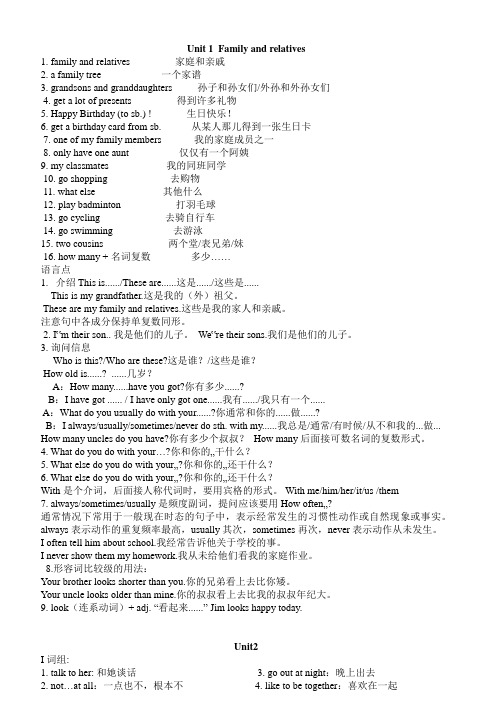
Unit 1 Family and relatives1. family and relatives 家庭和亲戚2. a family tree 一个家谱3. grandsons and granddaughters 孙子和孙女们/外孙和外孙女们4. get a lot of presents 得到许多礼物5. Happy Birthday (to sb.) ! 生日快乐!6. get a birthday card from sb. 从某人那儿得到一张生日卡7. one of my family members 我的家庭成员之一8. only have one aunt 仅仅有一个阿姨9. my classmates 我的同班同学10. go shopping 去购物11. what else 其他什么12. play badminton 打羽毛球13. go cycling 去骑自行车14. go swimming 去游泳15. two cousins 两个堂/表兄弟/妹16. how many + 名词复数多少……语言点1.介绍 This is....../These are......这是....../这些是......This is my grandfather.这是我的(外)祖父。
These are my family and relatives.这些是我的家人和亲戚。
注意句中各成分保持单复数同形。
2. I‟m their son.. 我是他们的儿子。
We‟re their sons.我们是他们的儿子。
3. 询问信息Who is this?/Who are these?这是谁?/这些是谁?How old is......? ......几岁?A:How many......have you got?你有多少......?B:I have got ...... / I have only got one......我有....../我只有一个......A:What do you usually do with your......?你通常和你的......做......?B:I always/usually/sometimes/never do sth. with my......我总是/通常/有时候/从不和我的...做... How many uncles do you have?你有多少个叔叔? How many后面接可数名词的复数形式。
(完整word版)沪教版六年级英语上册-全套复习资料
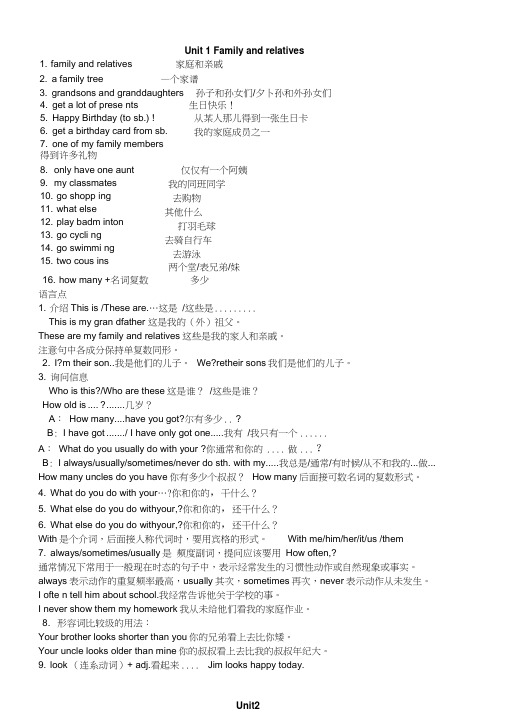
Unit 1 Family and relatives1. family and relatives 家庭和亲戚2. a family tree —个家谱3. grandsons and granddaughters 孙子和孙女们/夕卜孙和外孙女们4. get a lot of prese nts5. Happy Birthday (to sb.) !6. get a birthday card from sb.7. one of my family members 得到许多礼物生日快乐!从某人那儿得到一张生日卡我的家庭成员之一8. only have one aunt9. my classmates10. go shopp ing11. what else12. play badm inton13. go cycli ng14. go swimmi ng15. two cous ins仅仅有一个阿姨我的同班同学去购物其他什么打羽毛球去骑自行车去游泳两个堂/表兄弟/妹16. how many +名词复数多少语言点1. 介绍This is /These are.…这是/这些是.........This is my gran dfather 这是我的(外)祖父。
These are my family and relatives这些是我的家人和亲戚。
注意句中各成分保持单复数同形。
2. I?m their son..我是他们的儿子。
We?retheir sons我们是他们的儿子。
3. 询问信息Who is this?/Who are these这是谁?/这些是谁?How old is .... ? .......几岁?A:How many ....have you got?尔有多少.. ?B: I have got ......./ I have only got one.....我有/我只有一个......A:What do you usually do with your ?你通常和你的.... 做... ?B: I always/usually/sometimes/never do sth. with my.....我总是/通常/有时候/从不和我的...做... How many uncles do you have你有多少个叔叔?How many后面接可数名词的复数形式。
六年级英语上册Unit 8-11复习资料(沪教版)
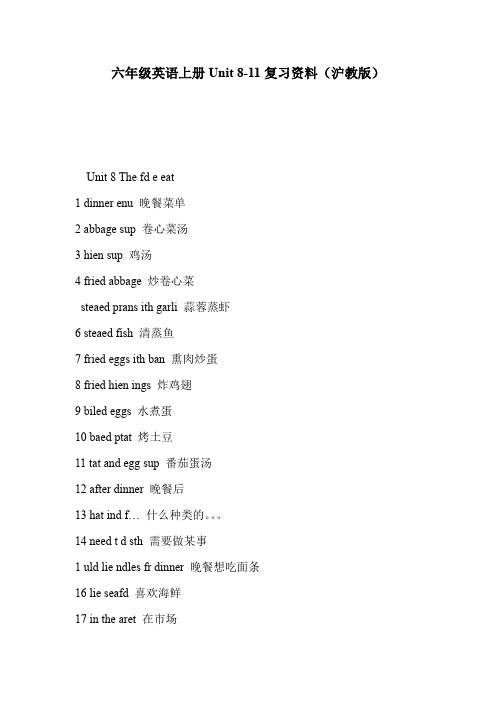
六年级英语上册Unit 8-11复习资料(沪教版)Unit 8 The fd e eat1 dinner enu 晚餐菜单2 abbage sup 卷心菜汤3 hien sup 鸡汤4 fried abbage 炒卷心菜steaed prans ith garli 蒜蓉蒸虾6 steaed fish 清蒸鱼7 fried eggs ith ban 熏肉炒蛋8 fried hien ings 炸鸡翅9 biled eggs 水煮蛋10 baed ptat 烤土豆11 tat and egg sup 番茄蛋汤12 after dinner 晚餐后13 hat ind f… 什么种类的。
14 need t d sth 需要做某事1 uld lie ndles fr dinner 晚餐想吃面条16 lie seafd 喜欢海鲜17 in the aret 在市场18 in the superaret 在超市19 at the fish stall 在鱼摊20 in the fruit setin 在水果部门21 freeze v 冰冻,结冰frzen ad 冰冻的freezing ad 极冷的eg frzen fd 冷冻食品freezing eather 严寒的天气22 lie t eat duplings 喜欢吃饺子23 a paet f 一包/袋24 t haburgers 两个汉堡包2 fruit salad 水果色拉语言点1 fr breafast/lunh/supper/dinnerhat uld u lie fr dinner tnight?今天晚饭你们想吃什么?fr在这里表目的,用途tnight=this eveninglast night=esterda evening2’d=uld ‘d是uld的缩写形式。
uld lie sth=ant sth想要某物uld lie t d sth=uld lve t d sth=ant t d sth想要做某事lie sth喜欢某物lie t d sth/lie ding sth喜欢做某事I uld lie se apples我想要一些苹果。
沪教版六年级英语复习资料(已标注重点)
沪教版六年级英语复习资料(已标注重点)
为了帮助六年级的学生复英语,我准备了以下复资料。
这些资料基于沪教版课本,并已标注重点内容。
希望这份资料能帮助学生们更好地复和准备英语考试。
Unit 1: My School Life
- 重点:常用动词的过去式,表示喜好和不喜欢的表达
Unit 2: Holidays
- 重点:问路和指路的表达,描述旅行活动
Unit 3: My Hobbies
- 重点:运动和爱好的表达,频度副词的使用
Unit 4: My City
- 重点:城市地标和景点的描述,询问和提供信息的能力
Unit 5: Healthy Habits
- 重点:身体部位和健康惯的描述,建议和禁止的表达
Unit 6: At the Zoo
- 重点:描述动物的外貌和行为,询问和提供信息的能力
Unit 7: Food and Drinks
- 重点:食物和饮料的名称,句式“What do you want?”的用法
Unit 8: My Family
- 重点:家庭成员和关系的描述,家庭活动的表达
Unit 9: My Daily Routine
- 重点:日常活动的表达,日常时间的描述
Unit 10: Jobs
- 重点:职业名称和工作内容的描述,询问和回答关于职业的问题
以上是本复资料的主要内容。
希望学生们能通过复这些重点内容来巩固英语知识,取得优异的成绩。
祝大家研究愉快!
(注意:本文档内容仅供复习参考,具体考试内容以教材为准。
)。
(word完整版)牛津沪教版英语六年级上重点知识复习及练习
2. “Instead of helping you, your own language gets in your way.”This sentence means that memorizing your own language can ________.A.help you to study English wellB.stop you mastering EnglishC.make English easy to learnD.help you notice mistakes3.Equally important is to feel the language. “to feel the language” here means________.A.to get a knowledge of English by touchingB.to be able to read and write EnglishC.to translate English into your own by imaginingD.to be able to experience the rich sensation of the languageBWhen we can see well, we do not think about our eyes often. It is only when we can not see perfectly that we come to see how important our eyes are.People who are nearsighted can only see things that are very close to their eyes. Many people who do a lot of close work, such as writing and reading, become nearsighted. Then they have to wear glasses in order to see distant things clearly. People who are farsighted face just the opposite problem. They can see things that are far away, but they have difficulty reading a book unless they hold it at arm’s length. If they want to do much reading, they must get glasses too.Other people do not see clearly because their eyes are not exactly the right shape. This, too, can be corrected by glasses. Some people’s eyes become cloudy because of cataracts. Long ago these people often became blind. Now, however, it is possible to operate on the cataracts and remove them.When night falls, colors become fainter to the eyes and finally disappear. After your eyes have grown used to the dark, you can see better if you use the side of your eyes rather than the centers. Sometimes, after dark, you see a small thing to one side of you, which seems to disappear if you turn your head in its direction. This is because when you turn your head, you are looking at the thing too directly. Men on guard duty sometimes think they see something moving to one side of them. When they turn to look straight at it, they can not see it any more, and they believe they were mistaken. However, this mistake happens because the center of the eye, which is very sensitive in daylight, is not as sensitive as the sides of the eye after dark.4.We don’t know that our eyes are of great importance until ________.A. we think about our eyesB. we cannot see clearlyC. we wear glassesD. we have to do much reading5.According to the passage, a ________ is more likely to be nearsighted.A.tailorB. doctorC. guardD.painter6.People who are farsighted ________ .A.cannot do a lot of close work without glassesB.can only see things that are very close to their eyesC.have difficult y reading a book if they hold it at arm’s lengthD.have the same problem as the nearsighted people7.To see a small thing at night, it is better to look ________ .A.with wide open eyesB.with half shut or narrowed eyesC.straight at itD.in a slightly different directionC Read and answer the questions.Children from all over the word like to celebrate (庆祝) their birthdays. American children are of no difference. American children usually celebrate with a party. They invite their friends to join the party. The party may not be held on the exact date of birthday if it comes to a school day. It may be held on the closest weekend instead.Today two kinds of parties are the most popular. One is held at home. Parents make their house beautiful with balloons and coloured paper. They prepare a special birthday meal. The children play games. The other one is held away from home. Some are at a special restaurant. The children eat pizza and ice cream. The waiters, who serve the food, also sing and tell jokes to the children. Other parties may be held at a park, a movie theatre or some other places.( ) 2 They are going to the supermarket by bus.( ) 3 The supermarket is not far away from their home.( ) 4 Dick's mother is going to buy a lot of food for the next week.( ) 5 Dick is going to buy a video game machine but he can't play it all the time.( ) 6 They are going to stay in the supermarket for 5 hours.Ⅴ.Choose the right answer.It's Sunday. Mother, father and the children are going to the beach.Alice: Where are we going, Dad?Father. Let's look at the map. Let me see. We will go to the East Point Beach.Mother: We'll swim in the sea.David: Are we going to have a picnic?Alice: Yes, of course.David: That's nice.Father: Come on! Let's all get in the car!Alice: What's wrong (怎么了), Dad?Father: The car can't start (发动)!Mother: So we will all stay at home.Alice: Let's have a picnic in the garden!David: Great!( )1 The family is going to ____________ .A. swim in the seaB. have a picnicC. swim and have a picnic( )2 They are going there ____________ .A. by busB. by carC. by underground( )3 They won't go to the beach ______________ .A. because it is rainyB. because Father is not fineC. because the car doesn't start( ) 4 They will have the picnic _____________ in the end.A. on the beachB. in the gardenC. in the carⅥ.Read the passage and fill in the blanks with proper words.It will be grandfather's s______________ birthday next Sunday. We are going to have a big birthday p____________. Uncles and aunts will buy some p______________for him. But I want to make a nice birthday c______________for grandfather. Mum and Dad are going to buy a lot of food from the s______________.【Keys】I. 1. Tom is speaking Chinese.。
(完整word)沪教版六年级英语(上册)_(全套)复习资料全,推荐文档
Unit 1 Family and relatives1. family and relatives 家庭和亲戚2. a family tree 一个家谱3. grandsons and granddaughters 孙子和孙女们/外孙和外孙女们4. get a lot of presents 得到许多礼物5. Happy Birthday (to sb.) ! 生日快乐!6. get a birthday card from sb. 从某人那儿得到一张生日卡7. one of my family members 我的家庭成员之一8. only have one aunt 仅仅有一个阿姨9. my classmates 我的同班同学10. go shopping 去购物11. what else 其他什么12. play badminton 打羽毛球13. go cycling 去骑自行车14. go swimming 去游泳15. two cousins 两个堂/表兄弟/妹16. how many + 名词复数多少……语言点1.介绍 This is....../These are......这是....../这些是...... This is my grandfather.这是我的(外)祖父。
These are my family and relatives.这些是我的家人和亲戚。
注意句中各成分保持单复数同形。
2. I‟m their son.. 我是他们的儿子。
We‟re their sons.我们是他们的儿子。
3. 询问信息Who is this?/Who are these?这是谁?/这些是谁?How old is......? ......几岁?A:How many......have you got?你有多少......? B:I have got ...... / I have only got one......我有....../我只有一个......A:What do you usually do with your......?你通常和你的......做......?B:I always/usually/sometimes/never do sth. with my......我总是/通常/有时候/从不和我的...做...How many uncles do you have?你有多少个叔叔? How many后面接可数名词的复数形式。
沪教版六年级英语(上册)_(全套)复习资料全
Unit 1 Family and relatives1. family and relatives 家庭和亲戚2. a family tree 一个家谱3. grandsons and granddaughters 孙子和孙女们/外孙和外孙女们4. get a lot of presents 得到许多礼物5. Happy Birthday (to sb.) ! 生日快乐!6. get a birthday card from sb. 从某人那儿得到一张生日卡7. one of my family members 我的家庭成员之一8. only have one aunt 仅仅有一个阿姨9. my classmates 我的同班同学10. go shopping 去购物11. what else 其他什么12. play badminton 打羽毛球13. go cycling 去骑自行车14. go swimming 去游泳15. two cousins 两个堂/表兄弟/妹16. how many + 名词复数多少……语言点1.介绍 This is....../These are......这是....../这些是...... This is my grandfather.这是我的(外)祖父。
These are my family and relatives.这些是我的家人和亲戚。
注意句中各成分保持单复数同形。
2. I‟m their son.. 我是他们的儿子。
We‟re their sons.我们是他们的儿子。
3. 询问信息Who is this?/Who are these?这是谁?/这些是谁?How old is......? ......几岁?A:How many......have you got?你有多少......? B:I have got ...... / I have only got one......我有....../我只有一个......A:What do you usually do with your......?你通常和你的......做......?B:I always/usually/sometimes/never do sth. with my......我总是/通常/有时候/从不和我的...做...How many uncles do you have?你有多少个叔叔? How many后面接可数名词的复数形式。
- 1、下载文档前请自行甄别文档内容的完整性,平台不提供额外的编辑、内容补充、找答案等附加服务。
- 2、"仅部分预览"的文档,不可在线预览部分如存在完整性等问题,可反馈申请退款(可完整预览的文档不适用该条件!)。
- 3、如文档侵犯您的权益,请联系客服反馈,我们会尽快为您处理(人工客服工作时间:9:00-18:30)。
Unit 8 The food we eat1. dinner menu 晚餐菜单2. cabbage soup 卷心菜汤3. chicken soup 鸡汤4. fried cabbage 炒卷心菜5. steamed prawns with garlic 蒜蓉蒸虾6. steamed fish 清蒸鱼7. fried eggs with bacon 熏肉炒蛋8. fried chicken wings 炸鸡翅9. boiled eggs 水煮蛋10. baked potato 烤土豆11. tomato and egg soup 番茄蛋汤12. after dinner 晚餐后13. What kind of…什么种类的。
14. need to do sth. 需要做某事15. would like noodles for dinner 晚餐想吃面条16. like seafood 喜欢海鲜17. in the market 在市场18. in the supermarket 在超市19. at the fish stall 在鱼摊20. in the fruit section 在水果部门21. freeze v. 冰冻,结冰 frozen adj. 冰冻的 freezing adj. 极冷的e.g. frozen food 冷冻食品 freezing weather 严寒的天气22. like to eat dumplings 喜欢吃饺子23. a packet of 一包/袋24. two hamburgers 两个汉堡包25. fruit salad 水果色拉语言点1. for breakfast/lunch/supper/dinnerWhat would you like for dinner tonight?今天晚饭你们想吃什么? for在这里表目的,用途tonight=this eveninglast night=yesterday evening2.‘d=would‗d是would的缩写形式。
would like sth.=want sth.想要某物 would like to do sth.=would love to do sth.=want to do sth.想要做某事like sth.喜欢某物 like to do sth./like doing sth.喜欢做某事I would like some apples.我想要一些苹果。
I like apples.我喜欢苹果。
I would like to swim after school.放学后我想去游泳。
I like swimming.=I like to swim.我喜欢游泳。
3.steamed eggs (with meat)(肉)炖蛋baked potato烤土豆boiled eggs水煮蛋fried eggs炒蛋在这里fried /boiled /steamed/ baked 都是动词fry v. 油炒/煎/炸 boil v. 水煮 steam v. 蒸 n. 水蒸气 bake v. 烘,烤的过去分词形式,在句中做定语。
相当于形容词的用法。
I would like fried eggs for dinner tonight.我晚饭想要吃炒蛋。
I fried eggs yesterday.我昨天炒了蛋。
4. Would you like rice or noodles for dinner tonight?你晚饭是想吃饭还是吃面条? or在这里是标示一种选择关系。
5.What kind of soup/fruit would you like?你想要哪种汤/水果?kind adj. 友善的,仁慈的= friendly e.g. be kind /friendly to othersn. 种类 e.g. different kinds of apples 不同种类的苹果 each kind of …每一种 What kind of …哪种… e.g. what kind of soup/sports6. I would also like some soup.=I would like some soup, too.also,too两个都可以表示―也‖, also用在句中,但是too用在句尾,并且要用逗号隔开。
I wouldn‘t like any soup, either. (否定句)(肯定句中句尾用―too‖,否定句中改为―either‖)7.need to do sth.需要做某事。
(实意动词)e.g. We need to buy some food first.否定句:We don‘t need to buy any food first.一般疑问句:Do we need to buy any food first? 回答:Yes, we do. / No, we don‘t.need sth. 需要某物 (实意动词) e.g. I need some noodles for lunch.*needn‘t do sth. 需要做某事 (情态助动词) e.g. We needn‘t buy any food now. 一般疑问句:Need we buy any food first? 回答:Yes, we need. / No, we needn‘t.8.shopping list 购物单。
Shopping动词的ing形式在句中充当定语。
9.favourite=like best最喜欢的 .favourite adj. 最喜爱的 n. favour 喜好e.g. English is my favourite subject. = I like English best.I like tomato best.=Tomato is my favourite.My favourite food is apples.=Apples are my favourite food.= I like apples best.10.Let‟s have tomato.让我们有西红柿。
Let后面接动词原形。
11.in the market / in the supermarket在市场/在超市at the fish/fruit/meat …stall在鱼/水果/肉……摊位in the fish/fruit/meat…s ection在鱼/水果/肉……部门in the market,at the fish/fruit/meat …stallin the supermarket,in the fish/fruit/meat…section12.A:Have you bought any garlic? 你买了一些大蒜吗?B: Yes, I have bought some garlic./ Yes, I have.是的,我买了些大蒜。
这是个现在完成时,bought是buy的过去分词.现在完成时的构成是: have/has +动词的过去分词。
Mum has bought some bacon.Mum hasn‘t bought any bacon.(否定句)Has Mum bought any bacon?(疑问句)Yes, she has. (No, she hasn‘t.)肯定(否定)回答What has Mum bought?(特殊疑问句)13. How much was it?=How much did it cost?= What was the price of it? 它多少钱。
How much is it?=How much does it cost?It was five yuan.=It cost five yuan.This book cost me ten yuan.This book didn‘t cost me ten yuan.How much did this book cost me?I spent ten yuan on this book.I spent ten yuan buying this book.I pay ten yuan for this book.price是―价格‖的意思。
compare the prices of food14.可数名词:drinks (饮料), noodles, sweets, vegetables, tomatoes, potatoes, sandwiches strawberry – strawberries不可数名词:food, garlic, meat, soup, fruit, salad, flour(面粉), bread, rice, milk, tea, juice …Unit 9 重点1. plan v. 计划,打算 plan to do sth. 计划做某事 plan—planning, plan… forplan a picnic, have a picnic, go for a picnicplan n. 计划 e.g. What is your holiday plan?2. fun n. 趣事 /U/ -- funny adj. .=interesting有趣的, 滑稽的Picnics are fun.**What fun it is to do sth.! What great fun it is!3. sweets n. 糖果 ; sweet adj. 甜的4. salt n. /U/ -- salty adj. spice n. – spicy adj. health n. – healthy adj.sun—sunny, cloud—cloudy, rain—rainy, fun—funnytaste v. – tasty adj.= delicious / nice=yummy bake---baked boil---boiledfry---fried steam---steamed5. chilli n. -- chillies (pl.)6. 感官系动词taste smell sound look feel +形容词。
e.g. taste nice with jam 蘸果酱尝起来美味7. buy sth. for sb. = buy sb. sth.e.g. buy some food and drink for the picnic为野餐买一些食物和饮料give sth. to sb. = give sb. sth.bring sth. to sb. = bring sb. sth.borrow sth. from sb. = borrow sb. sth.lend sth to sb. = lend sb. sth.8. have (drink) some apple juice/ some cola 喝一些苹果汁/一些可乐have (eat) some bread/some snacks/a packet of nuts 吃一些面包/一些小吃/一包坚果9. sweet cakes , salty nuts , spicy sausages , sour lemons , bitter coffeetoo sweet, too salty, too spicy, too sour, too bitter10. Let‟s buy some jam to spread on the bread.让我们买些果酱,把它涂在面包上。
